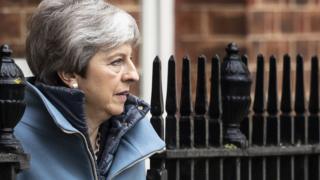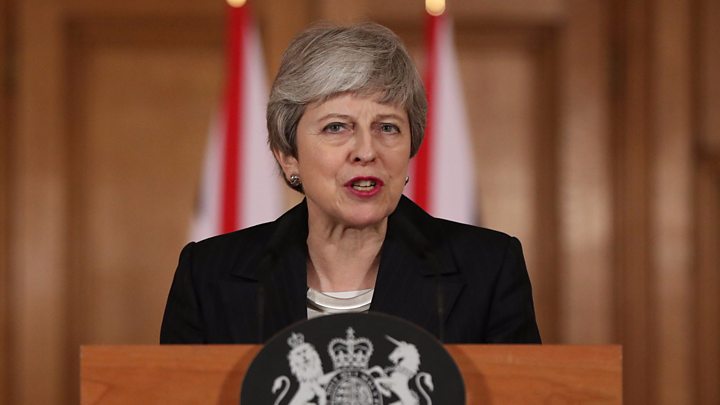Brexit: Vote on Theresa May's deal may not happen next week
 Image copyright
Getty Images
Image copyright
Getty Images
Theresa May has told MPs that a third vote on her Brexit deal may not take place next week "if it appears there is not sufficient support".
European Council President Donald Tusk said on Friday that Brexit's fate was "in Britain's hands".
EU leaders have agreed to delay the departure date by at least two weeks.
If MPs approve the PM's deal next week, Brexit will be delayed from 29 March until 22 May. Otherwise the UK has until 12 April to propose a new plan.
'Clear choices'
In a letter to all MPs on Friday evening, Mrs May said: "If it appears that there is not sufficient support to bring the deal back next week, or the House (of Commons) rejects it again, we can ask for another extension before 12 April - but that will involve holding European Parliament elections."
That was one of four "clear choices" she outlined, along with revoking Article 50, which she said would "betray the result of the referendum", leaving with no deal, or getting her deal approved next week.
The final option relies on Commons Speaker John Bercow allowing her to bring the deal back after he previously ruled that another vote couldn't be held without "substantial" changes to the deal.
Mrs May offered to talk to MPs over the coming days "as Parliament prepares to take momentous decisions".
Her letter came after the DUP - whose support will be crucial if the Government is to win - indicated they still would not back her deal.
Nigel Dodds, the party's deputy leader, said the prime minister had "missed an opportunity" to propose changes to the withdrawal agreement to help get it through the Commons.

Mrs May also referred to her televised address on Wednesday, in which she blamed the delay to Brexit on MPs.
She acknowledged that "a number of colleagues had raised concerns" about her words and it had not been her intention to make their "difficult job... any more difficult".
Mrs May also confirmed in her letter that the government would change the law to alter the UK's departure date from the EU next week.
Analysis
By Jonathan Blake, political correspondent
Theresa May's admission that there may not be a third vote on her deal after all will focus minds on what an alternative plan might be.
To avoid asking the EU for a longer extension and holding European parliament elections, the prime minister will need a new course of action.
A series of indicative votes in Parliament looks the most likely way to decide that - but there is no agreement on whether the government should lead that process or relinquish control to Parliament.
And when and if a consensus in Parliament emerges, there is no guarantee it will automatically become government policy.
It has taken two years for the government to formulate, negotiate and attempt to get a Brexit deal through Parliament.
Finding an alternative which ministers, MPs and the EU are happy to embrace within the next two weeks will be a very tough task indeed.
Speaking in Brussels on Friday, Mr Tusk said that until 12 April, "anything is possible" including a much longer delay or cancelling Brexit altogether.
He said he was "really happy" the 27 EU leaders had reached a unanimous decision to extend the two-year Article 50 process, under which the UK was due to leave the EU on 29 March.
"It means that until 12 April, anything is possible: a deal, a long extension if the United Kingdom decided to rethink its strategy, or revoking Article 50, which is a prerogative of the UK government.
"The fate of Brexit is in the hands of our British friends. As the EU, we are prepared for the worst, but hope for the best. As you know, hope dies last."
According to the final summit conclusions, the UK is expected to "indicate a way forward" before 12 April, if MPs do not approve the withdrawal deal negotiated with the EU, which would then be considered by the European Council.
The UK must decide by then whether it will take part in European Parliamentary elections from 23-26 May - if it does not, then a long delay would become "impossible", Mr Tusk said.
Referendum march
Meanwhile, supporters of another referendum will march through central London on Saturday.
Campaigners say they expect hundreds of thousands of people to attend the 'Put It To The People' demonstration, which will be addressed by Labour's deputy leader, Tom Watson, Scotland's First Minister, Nicola Sturgeon, London Mayor Sadiq Khan and others.
Ms Sturgeon said now was "the moment of maximum opportunity" to avoid a no-deal Brexit.
A petition on Parliament's website calling for Brexit to be cancelled by revoking Article 50 has attracted nearly four million signatures.
Lib Dem MP Layla Moran said the petition could "give oxygen" to the campaign for another Brexit referendum.
Timeline
29 March: Current Brexit date in UK law
12 April: If MPs do not approve the withdrawal deal next week - "all options will remain open" until this date. The UK must propose a way forward before this date for consideration by EU leaders
22 May: If MPs do approve the deal next week, Brexit will be delayed until this date
23-26 May: European Parliamentary elections are held across member states